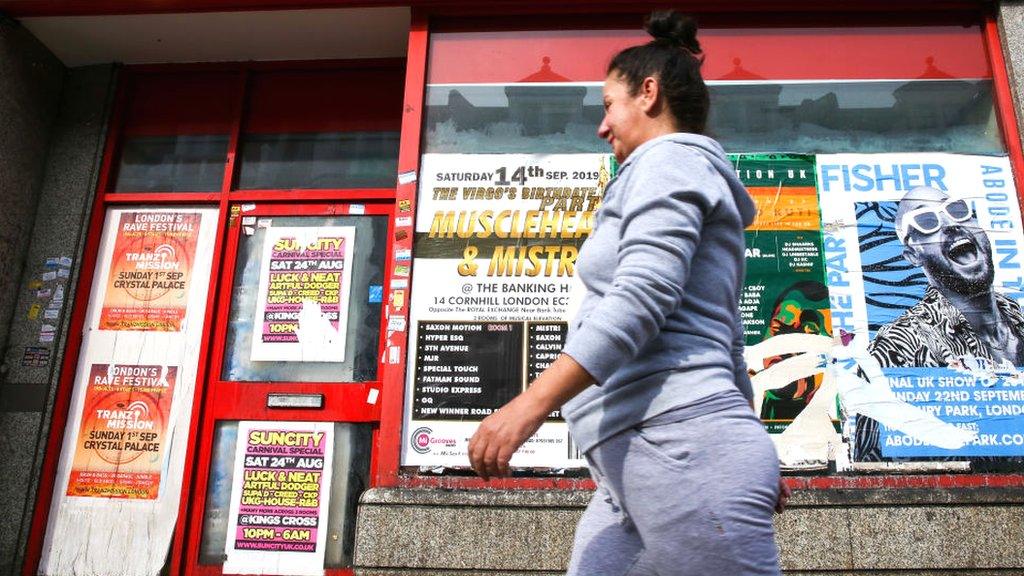The multimillionaire's plan to reinvent a town
- Published
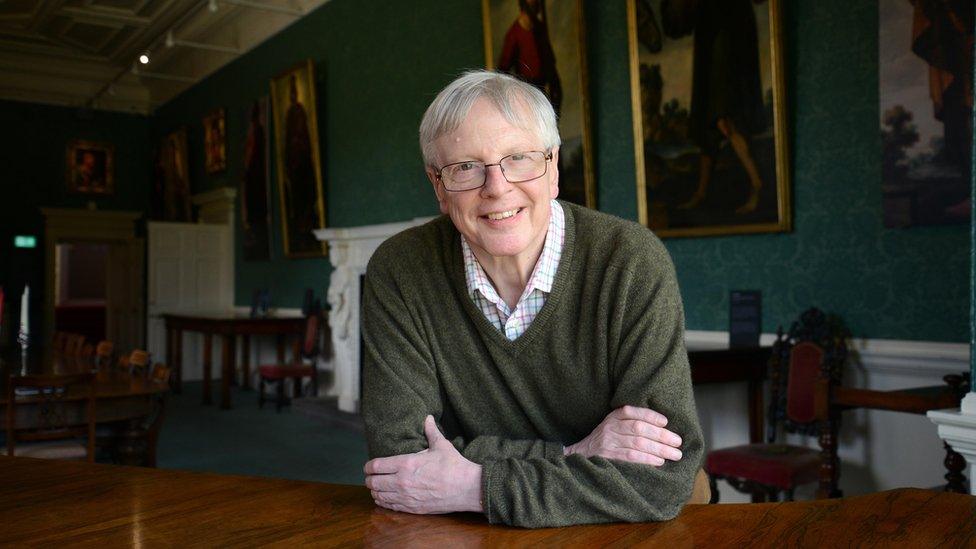
Former stockbroker Jonathan Ruffer had no connection to Bishop Auckland until a decade ago
Clarks in Bishop Auckland was once a place where tiny feet were squeezed into their first pair of school shoes. Now, half-packed cardboard boxes are strewn across the deserted shop floor.
"This isn't goodbye," the notice in the window reassures passers-by. You can still buy Clarks shoes online - or drive 20 minutes to Durham.
Clarks is just the latest shop to close its doors in the north-eastern English town. More than one in five properties lie vacant, almost double the national average of 12%. The deteriorating centre - its shop windows smeared with white paint - tells a similar story to many high streets across the country, which have struggled with the rise of online shopping.
Bishop Auckland, with its 25,000 residents, used to be the heart of coal-mining country. The gradual demise of the industry in the latter half of the last century brought with it decades of economic decline.
But the fortunes of the town may be about to change. It has something that others don't: a multimillionaire willing to pour his own money into its revival.
Former stockbroker Jonathan Ruffer's interest in Bishop Auckland isn't immediately clear - the 68-year-old had no connection to Bishop Auckland until a decade ago. But the avid art collector decided to intervene when the Church of England chose to sell the town's most famous paintings that hung in Auckland Castle.
He bought the set of portraits by the Spanish master Francisco de Zurbaran. Then he bought the castle.
"My original intention was to buy the paintings as a way of saying 'I am on your side' to the community," says Mr Ruffer. "I was on the lookout for some way to engage with somewhere in the North East. I'm not the slightest bit interested in visitor attractions, I'm only interested in regeneration."
After three years of extensive renovations, the 900-year-old castle re-opened to the public last year.
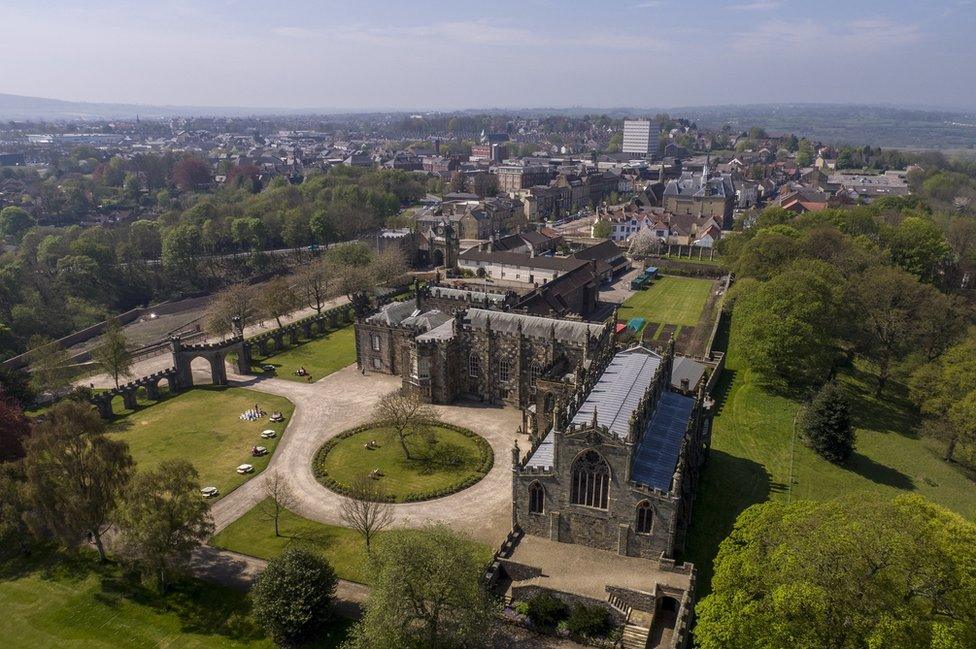
Auckland Castle, once home to the Prince Bishops of Durham
So how much money is the businessman willing to spend? "I'm very shy when it comes to talking about the amount of expenditure," he says. "I'm a drain-pipe - whatever comes in at the top, leaves the bottom," he adds cryptically.
Mr Ruffer grew up in Stokesley, near Middlesbrough, before heading south to study at Cambridge University. He went on to become one of the City's most successful fund managers, co-founding a London-based investment company. There he served wealthy clients and managed billions of pounds' worth of assets. It made him rich, too.
Then Mr Ruffer, who describes himself as "quite Goddy", decided to give most of his fortune away. Philanthropy is a "vomit-inducing word", the devout Christian says, but he can't find another way to describe what he is doing.
Seven years ago, Mr Ruffer started a charity to reinvigorate Bishop Auckland. Out of it has come an art museum documenting life in the coal mines, and from next year, tourists will be able to visit a Spanish art gallery which will house the masterpieces he bought 10 years earlier.
A glass-domed restaurant in the walled gardens of the castle will open, and there is a plan to renovate several derelict hotels. The Auckland Project has also been buying up empty shops, but its proposals for them are still under wraps.
Bishop Auckland: 'You're opening up something that was abandoned'
Although Mr Ruffer is vague about the exact amount he's spending, the scale of the project is clear. He hopes the tourist attractions, which are just off the main shopping artery, Newgate Street, will help the "circulation of blood" to the town centre.
But what do the locals make of it?
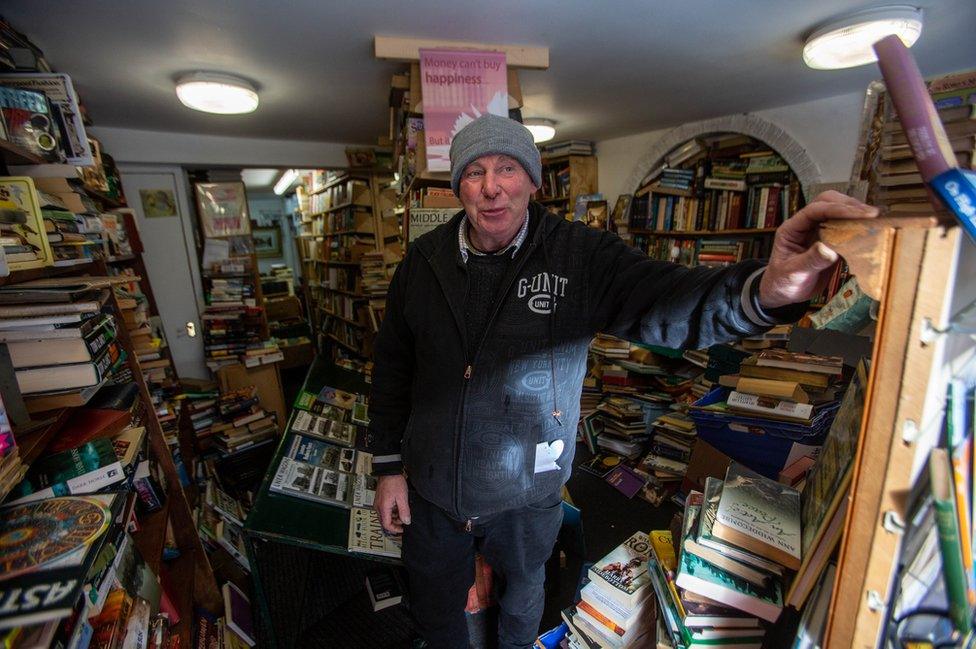
The council hopes visitors will shop in independent businesses like The Other Book Shop, owned by Gordon Draper
David Little, who works in a shop on the High Street selling electrical appliances, says the castle is "beautiful", but its custom "doesn't trickle down to day-to-day business". "People go to the castle and go home," he says. "Tourists don't see Bishop - they see a car park."
Mr Little, who has worked in the shop for 24 years, says old-fashioned customer service and a loyal following has helped the business survive, but he has seen a decline over the years. "The footfall just isn't what it used to be," he says. "There's businesses going all the time."

Liam Guille, who started a film memorabilia shop with his father last year, says Mr Ruffer's investment is "definitely" a good thing
One of the things sucking trade away from the high street is a new out-of-town retail park. In a heavy blow, Marks & Spencer upped sticks and moved to the complex in 2013, despite a petition signed by thousands of locals. By 2017, the big names were stampeding to the exit. Dorothy Perkins and Beales were among 20 chains that shut up shop.
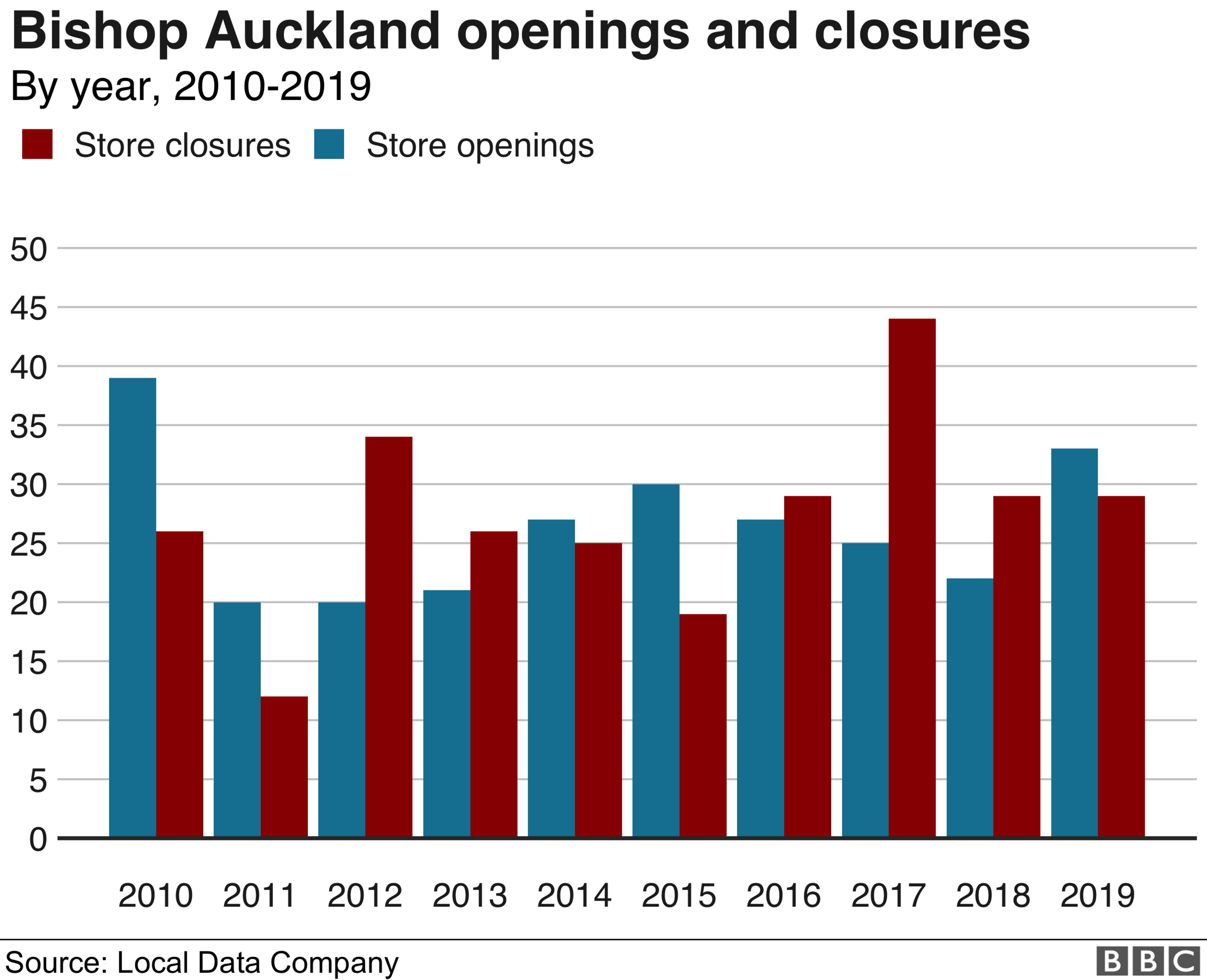
The dramatic changes over the last ten years are illustrated by interactive map below, which uses figures on openings and closures collected by the Local Data Company. There are now 61 vacant units - more than half of which have sat empty for more than three years.
Sorry, your browser cannot display this map
Source: Local Data Company, map built using Carto
Carl Marshall, who is responsible for economic regeneration at Durham County Council, insists the retail park is not solely to blame for the high street's decay. "Consumer habits have changed," he says. "If they weren't accessing out-of-town retail in Bishop Auckland they would just be travelling into Durham city, just up the road."
So instead of trying to hang on to the big national retailers, the council is counting on Bishop Auckland attracting tourists who will visit local independent shops. Some new businesses have opened in recent years, with the number of cafes increasing. The new shops are not hipster boutiques - one of the cafes is a '50s-themed coffee shop which sells cream teas.
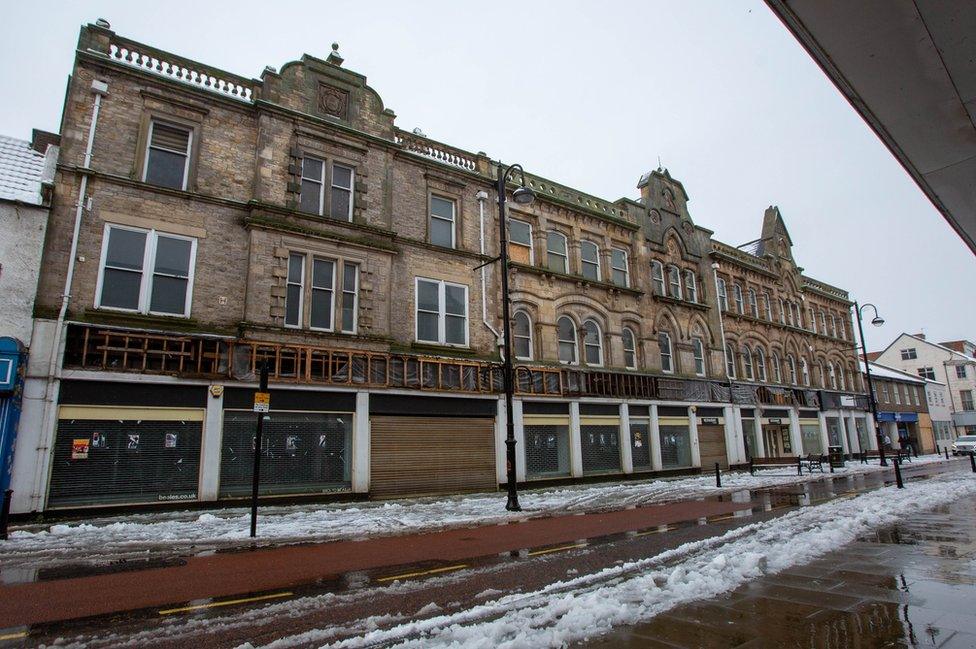
Department store Beales left behind an empty shop when it closed its doors in 2017
While the council has bid for a £25m slice of a government fund to help struggling high streets, it's aware that Mr Ruffer's investment is on a scale that no local authority could match. Mr Ruffer is a "visionary" who has given Bishop Auckland a "unique opportunity" to become a tourist attraction, the councillor says.
For a family-run business that was set up more than 50 years ago, Mr Ruffer's investment offers hope. Luca Rea-Dobson - a scaffolder who helps his mother Anna run the "proper cafe" - says the businessman's presence is a "blessing". He laughs as he says the former stockbroker "could have gone anywhere". But Mr Rea-Dobson says the businessman's investment has "split the town", with some locals becoming impatient. "You get a lot of people complaining that it's not happened overnight," he says.
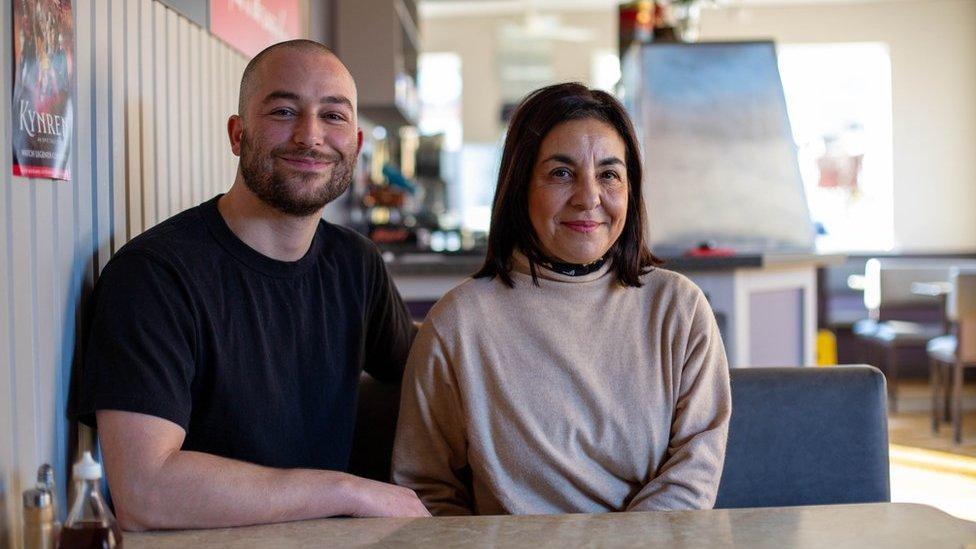
Anna Rea-Dobson and her son Luca, who own Rio Bar cafe in Bishop Auckland, hope investment will revive the town
One of the multimillionaire's first projects was Kynren, an annual outdoor show on a farm near the castle that started in 2016. The performance tells the history of England with a 1,000-strong cast and crew made up of local volunteers.
"I laughed when I first heard about it," says Mr Rea-Dobson. But he volunteered to take part anyway. "I had sleepless nights - I put scaffolding up for a living. I'd never wielded a sword before," he says. "But after the first show, the whole town was buzzing."
Kynren is now a top UK attraction on TripAdvisor.
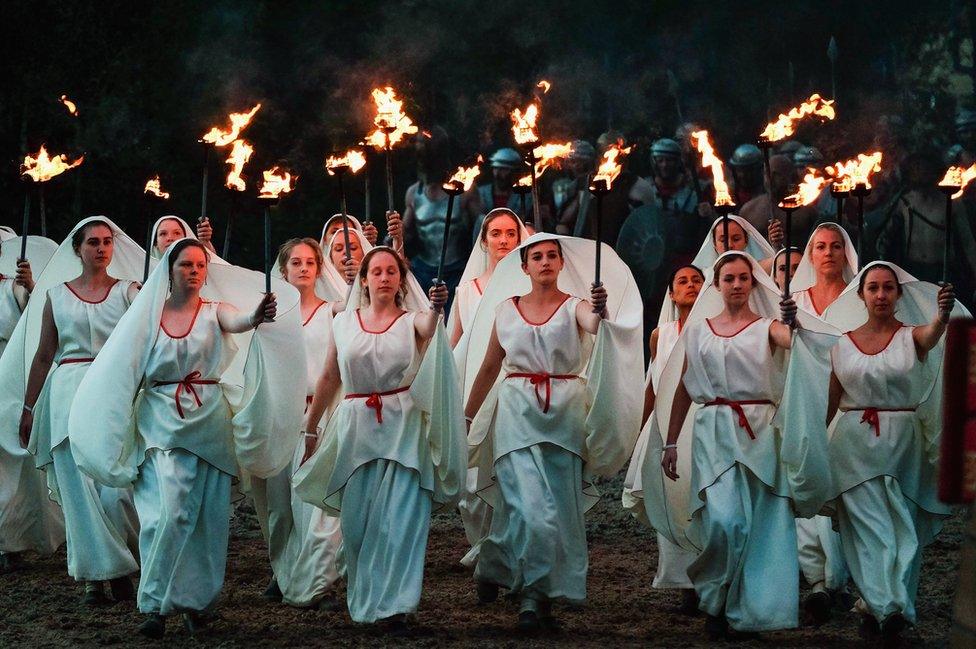
Kynren, an annual outdoor show on a farm near the castle, has become a popular visitor attraction
Despite such successes, Mr Ruffer is aware that regenerating Bishop Auckland will take time. "We always felt this was a 25 year project," he says. "We're not quite half way through."
In the meantime, Mr Rea-Dobson's mum, Anna, says she is seeing fewer and fewer people come through her cafe's door, although a loyal base of older regulars is keeping her going. She finds the promise of future trade from Mr Ruffer's tourist attractions encouraging. "It's what I hang on to, really," she says. She pauses, then adds: "How long I can hang on is another thing."
Bishop Auckland's high street faces significant challenges. Like other towns, it's going to have to adapt to survive, though it's lucky to have a rich heritage and historical assets to make the most of. Its past is its future, in many ways, but saving a town isn't a quick fix.
Still, could this town be at a tipping point?
BBC News will be following the progress of Bishop Auckland's town centre this year as part of the #BBCMyHighStreet project.
Do you have a story about your local high street which we should cover? Email myhighstreet@bbc.co.uk
- Published13 January 2020
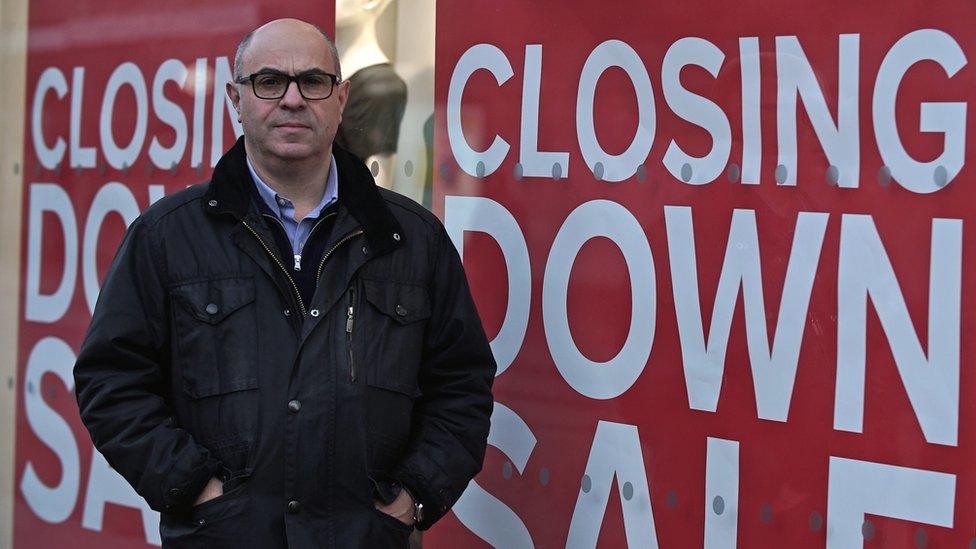
- Published23 October 2019
